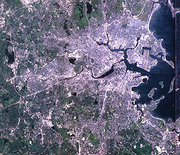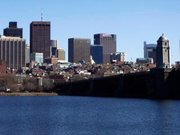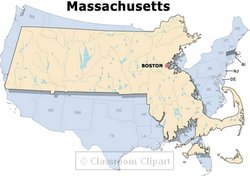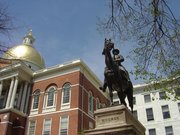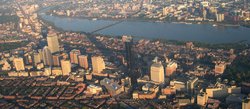Boston, Massachusetts
|
|
Template:US City infobox Boston is the capital and the largest city in the Commonwealth of Massachusetts in the United States. The city is also the county seat of Suffolk County. It is the unofficial capital of the region known as New England as well as one of the oldest and wealthiest cities in the United States, with an economy based on education, health care, finance, and high technology. Its nicknames include "Beantown", "The Hub" (shortened from Oliver Wendell Holmes' phrase The Hub of the Universe), "The City of Higher Learning" (due to the plethora of universities and colleges in the Boston area) and, particularly in the Nineteenth Century, "The Athens of America," owing to its great cultural and intellectual influence.
As of the 2000 census, its population was 589,141. The Greater Boston metropolitan area, including nearby cities and towns such as Cambridge, Brookline, and Quincy as well as many suburban communities further from the city, has a population of approximately 5.8 million residents. Greater Boston is one of the top-ten largest metropolitan areas in the United States, the fifteenth in the Americas, and the one of the top-fifty largest in the world.
| Contents |
History
Main article: History of Boston
Boston_Old_State_House-200px.jpg
Boston has an illustrious history that spans nearly four centuries. Its history is inherently intertwined with the history of the United States.
Founded on September 17, 1630, on a peninsula called Shawmut by the Native Americans who lived there, Boston is named after Boston, England, a town in Lincolnshire from which several prominent colonists originated. Early colonists believed that Boston was a community with a special covenant with God. Winthrop's sermon, "a City upon a Hill," captured this idea. These values molded an extremely stable and well-structured society in Boston. Indeed, Puritan values of hard work, moral uprightness, and education remain a part of Boston's culture.
Boston played a key role in sparking both the American Revolution and the ensuing American Revolutionary War. The Boston Massacre, the Boston Tea Party, and several of the early battles of the Revolution (such as the Battle of Lexington and Concord, the Battle of Bunker Hill, and the Siege of Boston) occurred in or near the city. During this period, Paul Revere made his famous midnight ride.
After the revolutionary war, the city became one of the world's wealthiest international trading ports, exporting products such as rum, fish, salt and tobacco. It was chartered as a city in 1822, and by the mid-1800s it was one of the largest manufacturing centers in the nation, noted for its garment production, leather goods, and machinery industries.
Scollay1880s.jpg
The city has several notable "firsts." Both the first school in America, Boston Latin School (1635), and the first college in America, Harvard College (1636), were founded in the early days of Boston. During the 1800s, the first medical school for women, The Boston Female Medical School (which later merged with the Boston University School of Medicine), opened in Boston on November 1, 1848. Also, on September 1, 1897, the Tremont Street Subway opened as the first underground streetcar subway in North America. Today it is known as "The T" and is run by the Massachusetts Bay Transportation Authority.
On August 23 1927, Italian anarchists Sacco and Vanzetti were sent to the electric chair after a seven-year trial in Boston. Their execution sparked riots in London, Paris and Germany, and helped to reinforce the image of Boston as a hotbed of intolerance.
Recently, Boston has experienced a loss of regional institutions and traditions, which once gave it a very distinct social character, as it has become part of the more homogenized BosWash megalopolis. Despite these losses, Boston's ambiance has improved in recent years — city streets bustle with a vitality not seen since the 1920s, crime and poverty remain low for an American city, and once again Boston has become a hub of intellectual, technological, and political ideas.
Related articles
- American Revolution
- American Revolutionary War
- Boston Massacre
- Boston Tea Party
- Battle of Lexington and Concord
- Siege of Boston
Geography and climate
According to the United States Census Bureau, the city has a total area of 232.1 km² (89.6 mi²). 125.4 km² (48.4 mi²) of it is land and 106.7 km² (41.2 mi²) of it is water. The total area is 45.98% water.
Much of the Back Bay, and South End are built on reclaimed land—two and a half of Boston's three original hills were used as a source of material for the landfill. Only Beacon Hill, the smallest of the three original hills, remains partially intact.
Boston is bordered by the cities of Revere, Chelsea, Everett, Somerville, Cambridge, Watertown, Newton, and Quincy, and the towns of Winthrop, Brookline, Needham, Dedham, Canton, and Milton.
The Charles River separates Boston from Cambridge, and Charlestown. To the east lies Boston Harbor and the Boston Harbor Islands, many of which are open to the public. The Neponset River forms the boundary between the city and its southeast neighbors, Quincy and Milton.
The weather in Boston, like much of New England, changes rapidly. The summers are usually warm and humid, while the winters are cold and windy. It has been known to snow in October and get quite warm in February. The hottest month is August, with an average high of 80 °F (27 °C) and a low of 64 °F (18 °C). The coldest month is January with an average high of 35.6 °F (2 °C) and a low of 21.5 °F (−6 °C). The city averages 42 in. (1,100 mm) of rainfall a year. It also coincidentally averages 42 in. (1,100 mm) of snowfall a year, though this increases dramatically as one goes inland away from the city.
Mark Twain is quoted as saying If you don't like the weather in New England, just wait a few minutes. Boston is no exception to this rule. The outer suburbs of Boston, which tend to be forested, have vibrantly-colored foliage every autumn that attracts many tourtists. In the winter, the Frog Pond at Boston Common doubles as a popular ice-skating rink.
Demographics
As of the censusTemplate:GR of 2000, there are 589,141 people, 239,528 households, and 115,212 families residing in the city. The population density is 4,696.9/km² (12,165.8/mi²). There are 251,935 housing units at an average density of 2,008.5/km² (5,202.5/mi²). The Irish are the largest ethnic group in the city of Boston. Boston is the capital of "Irish America". The racial makeup of the city is 54.48% White, 25.33% Black or African American, 0.40% Native American, 7.52% Asian American, 0.06% Pacific Islander, 7.83% from other races, and 4.39% from two or more races. 14.44% of the population are Hispanic or Latino of any race. These figures become less reliable due to the large undocumented Brazilian population, estimated by some studies to approach 250,000 in Massachusetts. Census data does not account for this significant segment of the community because of confusing terminology, as Brazilians speak Portuguese and often do not consider themselves Hispanic or Latino.
There are 239,528 households out of which 22.7% have children under the age of 18 living with them, 27.4% are married couples living together, 16.4% have a female householder with no husband present, and 51.9% are non-families. 37.1% of all households are made up of individuals and 9.1% have someone living alone who is 65 years of age or older. The average household size is 2.31 and the average family size is 3.17.
In the city the population is spread out with 19.8% under the age of 18, 16.2% from 18 to 24, 35.8% from 25 to 44, 17.8% from 45 to 64, and 10.4% who are 65 years of age or older. The median age is 31 years. For every 100 females there are 92.8 males. For every 100 females age 18 and over, there are 90.2 males.
The median income for a household in the city is $39,629, and the median income for a family is $44,151. Males have a median income of $37,435 versus $32,421 for females. The per capita income for the city is $23,353. 19.5% of the population and 15.3% of families are below the poverty line. Out of the total population, 25.6% of those under the age of 18 and 18.2% of those 65 and older are living below the poverty line.
The city is divided into many neighborhoods (http://www.cityofboston.gov/neighborhoods/), including: Allston, Back Bay, Beacon Hill, Brighton, Charlestown, Dorchester, East Boston, Jamaica Plain, Mattapan, Fenway/Kenmore, the North End, Hyde Park, Roslindale, Roxbury, South Boston, the South End, Chinatown, Bay Village and West Roxbury. Each of the neighborhoods has a distinct character. Allston/Brighton, for example, is populated mostly by students from nearby Boston University and recent graduates. The Back Bay, west of the Public Garden, is one of the wealthiest neighborhoods in the United States—it includes the shops and restaurants on Newbury Street and the two tallest skyscrapers in Boston. The South End, south of the Back Bay, is populated by gays, artists, yuppies, African Americans, and Hispanics—it is noted for its restaurant scene and bohemian atmosphere. Roxbury and Mattapan, located south of downtown, are populated largely by African Americans and Hispanics, as well as middle-class families priced out of more expensive neighborhoods. Dorchester is probably the most diverse Boston neighborhood being populated with every ethnic group. Boston is notable for having one of the most attractive and livable urban cores in the country; rents and housing prices are correspondingly high.
Law and government
Boston has a "strong mayor" system in which the mayor, Thomas Menino, is is vested with extensive executive powers. The mayor is elected to a four-year term by plurality voting (see List of Mayors of Boston, Massachusetts). The City Council is elected every two years. There are nine wards or neighborhood seats, each elected by plurality voting by the residents of that ward. There are four at-large seats. Each voter casts up to four votes for at-large councilors; no more than one vote per candidate. The top four vote-getters are elected. The President of the City Council is elected by the Councilors from within themselves. The School Committee is appointed by the mayor, as are city department heads.
In addition to city government, numerous state authorities and commissions play a role in the life of Bostonians, including the Massachusetts Water Resources Authority (water and sewer) and the state's Department of Conservation and Recreation, formerly known as the Metropolitan District Commission (some parks and most beaches). The Massachusetts Bay Transportation Authority runs the "T", Boston's public transport system. The Massachusetts Port Authority (Massport) operates Boston's Logan International Airport.
Boston is also the United States federal government center for New England. Properties include the John F. Kennedy Federal Office Building and the Thomas P. O'Neil Federal Building. The National Archives has a regional center in nearby Waltham. The city also serves as the home of the United States Court of Appeals for the First Circuit as well as the headquarters of the 1st District of the Federal Reserve Bank.
Colleges and universities
See also: List of colleges and universities in Massachusetts.
The Boston area is well-known for its colleges and universities.
Boston College was the first institution of higher education to be founded in Boston. However, it moved from the city's South End to then-rural Chestnut Hill to escape Boston's rapid urbanization in the late nineteenth century.
Harvard University, the nation's oldest university, was founded in Cambridge, where it maintains its main campus, though the bulk of its current land holdings lie in Boston. Cambridge is also the home of the world-renowned Massachusetts Institute of Technology.
The greater Boston area is home to over 100 colleges. Other schools in Boston proper include Berklee College of Music, Boston Conservatory, the Boston Architectural Center, Boston University, Emerson College, Emmanuel College, Fisher College, the Massachusetts College of Art, the New England Conservatory of Music, Northeastern University, Simmons College, and Suffolk University. Surrounding cities host Babson College, Bentley College, Brandeis University, Hellenic College, Lesley University, the Longy School of Music, Merrimack College, Pine Manor College, Regis College, Tufts University and Wellesley College, among others.
Arts and entertainment
Boston is considered to be a highly intellectual city. Mark Twain once wrote of it, In New York they ask "how much money does he have?" In Philadelphia, they ask, "who were his parents?" In Boston they ask, "how much does he know?" It is also considered one of the most culturally impressive cities in the world. The Theater District, south of Boston Common, contains a number of ornate theatres, including the Cutler Majestic Theatre and The Wang Center for the Performing Arts. Avant garde theatres are scattered throughout the city, especially along Huntington Avenue. The Boston Ballet is a world-renowned classical dance company. The Boston Globe Jazz and Blues Festival takes place each June; the Boston Early Music Festival takes place every odd-numbered year. The Boston Film Festival is held annually in early September. The weekend following Labor Day, the boutiques on Newbury Street close as over thirty art galleries spill out onto the street, providing unlimited access to their contents during Art Newbury Street.
Boston is also home to a wide array of musical talent from bands like Boston, Big D and the Kids Table, Dropkick Murphys, Godsmack, and Aerosmith, to the Boston Symphony Orchestra, the Boston Pops, the Boston Symphony Chamber Players, the Boston Philharmonic, the Boston Lyric Opera Company, and the Handel and Haydn Society (the oldest choral company in the U.S.) among many others.
Major annual events
- First Night (http://www.firstnight.org/) Boston's major New Year's Eve arts and activity festival, attracting over 1.5m people.
- Fourth of July on the Esplanade (fireworks and music on a massive scale)
- Saint Patrick's Day Parade
- Boston Marathon, the world-famous 26-mile run
- Boston LBGT Pride parade and festival (http://www.bostonpride.org/)
Boston in film, television, opera, and theatre
See also: List of television shows set in Boston
- Blow
- Blown Away
- Blue Hill Avenue
- The Boondock Saints
- The Brink's Job
- Coma
- Fever Pitch
- The Friends of Eddie Coyle
- Good Will Hunting
- Harvard Man
- Legally Blonde
- Love Story
- Monument Ave.
- Mystic River
- Next Stop Wonderland
- Night School
- The Paper Chase
- A Small Circle of Friends
- Southie
- St. Elsewhere
- Still We Believe: The Boston Red Sox Movie
- Thomas Crown Affair
- Un Ballo in Maschera, Opera by Giuseppe Verdi
- The Verdict
- Vig (Money Kings)
- What's the Worst That Could Happen?
- Walk East on Beacon!
Boston in fiction
See also: An annotated bibliography of fiction set in Boston (http://www.cas.suffolk.edu/richman/Boston/bosbib.htm) (external weblink)
- The Last Hurrah, by Edwin O'Connor; O'Connor's 1956 account of big-city politics, inspired by the career of longtime Boston Mayor James M. Curley.
- The Spenser detective novels, by Robert B. Parker.
- The Da Vinci Code, by Dan Brown; Boston is the home of protagonist Robert Langdon.
- The Bostonians, by Henry James; life in aristocratic Boston during the late nineteenth century.
- Looking Backward, utopian novel written in 1887 and set in Boston in 2000.
- The Handmaid's Tale, by Margaret Atwood; post-nuclear Cambridge and Boston are the setting of this dystopian novel.
- The Sound and the Fury, by William Faulkner; part of the story finds its setting in Boston.
- Zodiac, by Neal Stephenson; an eco-thriller focusing on industrial pollution in the Boston Harbor.
- Lemony Snicket's A Series of Unfortunate Events movie takes place in Boston, as seen on the envelope at the end of the movie. Specifically, "12 Prospero Place, Boston, Massachusetts, USA."
Economy
Boston's colleges and universities have drawn high-tech industries to the city, including computer hardware and software companies like EMC Corporation (headquartered in Hopkinton) and Akamai (headquartered in nearby Cambridge), as well as biotechnology companies like Millennium Pharmaceuticals and Biogen Idec. Other important industries include financial services, especially mutual funds and insurance. Boston headquartered Fidelity Investments helped popularize the mutual fund in the 1980s, and has made Boston one of the top financial cities in the United States.
Shoe and athletic apparel maker Reebok is headquartered in nearby Canton. Raytheon has its global headquarters in nearby Waltham while Novell also has its corporate headquarters there. Boston Scientific is located in Natick, and Gillette is headquartered in Boston. Teradyne, one of the world's leading manufacturer of semiconductors and other electronic equipment, has its corporate headquarters located in Boston.
The Port of Boston is the largest and busiest seaport in Massachusetts. It is also a major seaport along the United States east coast.
Health and medicine
As the home to some of the world's most respected research hospitals, Boston enjoys an international reputation in the medical field. One such hospital is the Massachusetts General Hospital (Mass General), which is affiliated with the Harvard Medical School. Rated as one of the best in the world, Mass General is the third oldest general hospital in the U.S., and the oldest and largest in New England. Another hospital affiliated with Harvard Medical is Beth Israel Deaconess Medical Center.
Other medical institutions include Brigham and Women's Hospital, Dana-Farber Cancer Institute, the Lahey Clinic, and Children's Hospital. The New England Medical Center is affiliated with Tufts University while the Boston Medical Center is the primary teaching facility for the Boston University School of Medicine.
Media
See also: Media in Boston.
The Boston Globe, owned by the New York Times Company, and The Boston Herald are Boston's two major daily newspapers. A local edition of The Metro, a free paper, is also available. The Boston Phoenix, The Improper Bostonian, and the Weekly Dig are weekly newspapers. As of October 2004, the Weekly Dig is owned by Boston Magazine. Spare Change is a bi-weekly paper. The Boston Independent Media Center (http://boston.indymedia.org/) provides alternative views. Just Rentals and Just Property are exclusive to Real Estate and are bi-weekly. The Improper Bostonian (http://www.improper.com/) is a biweekly "what's happening" guide to the Boston area.
Boston has the largest broadcasting market in New England, with the Boston radio market being the ninth largest in the United States. Several major AM stations include talk radio WRKO 680 AM, sports/talk station WEEI 850 AM, and news radio WBZ 1030 AM. A variety of FM radio formats serve the area as well as NPR stations WBUR and WGBH.
The Boston television DMA, which also includes Manchester, New Hampshire, is the fifth largest in the United States [1] (http://www.nielsenmedia.com/DMAs.html). The city is served by stations representing every major American network including:
- CBS - WBZ Channel 4
- ABC - WCVB Channel 5
- NBC - WHDH Channel 7
- FOX - WFXT Channel 25
- PBS - WGBH Channel 2, which also operates WGBX channel 44, is a major producer of PBS programs.
The city is also served by several Spanish-language television stations including those of Univision (WUNI channel 27, licensed to Worcester), TeleFutura (WUTF channel 66), and Telemundo (WNEU channel 60, licensed to Merrimack, New Hampshire, and simulcast on WTMU-LP channel 32). Most Boston television stations have their transmitters in nearby Needham and Newton.
Other television stations broadcasting in the Boston market are:
- Channel 38 - WSBK (UPN)
- Channel 46 - WWDP (ShopNBC)
- Channel 48 - WYDN (DayStar)
- Channel 56 - WLVI (WB)
- Channel 62 - WMFP (Shop At Home)
- Channel 68 - WBPX (PAX)
Sites of interest
See also: Sites of interest in Boston
North_End,_Boston.jpg
Due to the city's prominent role in the American Revolution, several historic sites relating to that period are preserved as part of the Boston National Historical Park. Many are found along the Freedom Trail, which is marked by a red line or bricks embedded in the ground. Such sites include:
- Boston Common, with the Boston Public Garden being adjacent
- Bunker Hill Monument
- Faneuil Hall
- Granary Burying Ground
- Massachusetts State House
- Old State House
- Old North Church
- Paul Revere's House
- USS Constitution
Once a shallow lagoon, the Back Bay district now includes many prominent landmarks and sites of interests such as the Christian Science Center, Boston Public Library, Copley Square, Newbury Street, and Trinity Church. Back Bay is also the home of two of New England's tallest buildings: the John Hancock Tower and the Prudential Center. Other notable districts/neighborhoods include Beacon Hill, Charlestown, Chinatown, Downtown Crossing, North End, and South Boston.
The Charles River, with long stretches of parks along its banks, is a major recreation site for many Bostonians. It is also the site of the Esplanade where the Boston Pops Orchestra play their annual Fourth of July concerts to large crowds.
Boston is home to several world-renowned museums, including the Museum of Fine Arts, the Isabella Stewart Gardner Museum, and the Museum of Science. The University of Massachusetts campus at Columbia Point houses the John Fitzgerald Kennedy Library. The New England Aquarium as well as the Franklin Park Zoo are located within the city.
Other sites of interest include Castle Island and Kenmore Square. There are also two self-guided walking tours: Harbor Walk (http://www.bostonharborwalk.com/), which is designed to allow people the walk the entire shore of Boston Harbor, and the Black Heritage Trail. Many of the Boston Harbor Islands are part of the Boston Harbor Islands National Recreation Area that is run by the National Park Service.
Sports
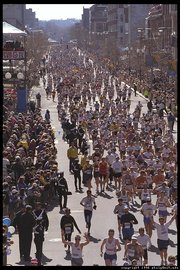
See also: U.S. cities with teams from four major sports
The TD Banknorth Garden near North Station is the home of two major league teams:
- Boston Bruins (Ice hockey - National Hockey League)
- Boston Celtics (Basketball - National Basketball Association).
The Celtics have the distinction of having more World Championships than any other NBA team with 16 championships from 1957 to 1986.
The baseball team Boston Red Sox is a member of the American League of Major League Baseball. They play at Fenway Park, the oldest ballpark in active use in the United States. After eighty-six years, the Red Sox became the World Series Winners (World Champions) in 2004. Boston was once the home of the National League baseball team Boston Braves as well as the site of the first World Series in 1903. The game was played between the Boston Pilgrims (currently the Boston Red Sox) and the Pittsburgh Pirates.
Nearby Foxboro is the home of the New England Patriots (National Football League), Super Bowl Winners in the 2001, 2003, and 2004 seasons; and the New England Revolution (Major League Soccer). Both teams play at Gillette Stadium.
Another major league team is the lacrosse team Boston Cannons of Major League Lacrosse. The team plays at Boston University's Nickerson Field.
Boston's many colleges and universities field sports teams. The most well-known include Boston College, Boston University, Northeastern University, and Harvard University. The city is also the site of two major annual sporting events: the Boston Marathon and the Head of the Charles Regatta.
Transportation
Main article: Boston transportation
- Airports
Logan International Airport, located in the East Boston neighborhood of the city, is the major airport serving Boston. Other airports serving the city and surrounding areas include:
- Hanscom Field in Lexington and Bedford
- T. F. Green Airport in Providence, Rhode Island
- Manchester Airport in Manchester, New Hampshire
- Roads and highways
Boston's streets appear as though they were not planned?a common fiction is that they evolved from old cowpaths. Except for the Back Bay and part of South Boston, the city has no street grid. Roads change names and lose and add lanes seemingly at random. The city also has a number of rotaries, which have confused many drivers.
Boston is the eastern terminus of I-90, also known as the Mass Pike. I-95, which surrounds the city, is also known as Route 128. US 1 and I-93 runs north to south through the city. The most infamous portion, the Central Artery, runs through downtown Boston. The old elevated highway was constantly prone to heavy traffic. Through the Big Dig, the elevated highway was replaced with a tunnel.
- Intercity trains and mass transit
Intercity trains operate from two stations. Amtrak's Northeast Corridor and Chicago lines originate at South Station and stop at Back Bay. Fast Northeast Corridor trains, which service New York City, Washington, D.C., and points in between, also stop at Route 128 Station in the southwestern suburbs of Boston. Meanwhile, Amtrak's Downeaster service to Maine originates at North Station.
The MBTA operates bus lines, commuter rail, subways, and water shuttles within the city and surrounding region.
Notable Bostonians
Main article: Notable Bostonians
Several people who were instrumental during the American Revolution and the early days of the United States hail from the Boston area. They include Samuel Adams, Benjamin Franklin, John Hancock, and Paul Revere. John Adams and John Quincy Adams were early U.S. Presidents.
Prominent Boston area politicians include members of the Kennedy family, such as John F. Kennedy, Robert Kennedy, and Joseph P. Kennedy, Sr. John Kerry, the Democratic candidate for President in 2004, maintains a home in Boston.
The Boston area has also produced several actors including Ben Affleck, Matt Damon, Leonard Nimoy, and Mark Wahlberg. Boston area musicians include Aerosmith and the rock band Boston. Other notable Bostonians include writers, inventors, and businesspeople such as Ralph Waldo Emerson, Oliver Wendell Holmes, Edgar Allan Poe, Samuel F. B. Morse, Alexander Graham Bell, and Sumner Redstone.
Fictional people from the city
- Trapper John McIntyre and Major Charles Emerson Winchester III from M*A*S*H
- The characters from the TV sitcom Cheers
- Sharon McKendrick and her mother Maggie from the 1961 version of the Parent Trap
- Faith from Buffy the Vampire Slayer, specifically South Boston.
Sister cities
Boston is a sister city (that is, a twinned town) of these municipalities:
- Kyoto, Japan
- Strasbourg, France
- Barcelona, Spain
- Hangzhou, People's Republic of China
- Melbourne, Australia
- Haifa, Israel
- Padua, Italy
- Taipei, Republic of China
- Sekondi-Takoradi, Ghana
- Portland, Oregon
References
- Boston Skyscrapers. Skyscrapers.com (http://www.emporis.com/en/wm/ci/?id=101045). Accessed May 15, 2005.
- 1903 World Series - Major League Baseball: World Series History. MLB.com (http://mlb.mlb.com/NASApp/mlb/mlb/history/postseason/mlb_ws_recaps.jsp?feature=1903). Accessed June 1, 2005.
External links
- City's official website (http://www.cityofboston.gov)
- Maps of Boston neighborhoods (http://www.cityofboston.gov/bra/maps/mapsPDFs.asp)
- City information (http://yourtown.boston.com/town/boston/)
- Greater Boston Convention & Visitors Bureau (http://www.bostonusa.com/)
- Guide to the local language (http://www.boston-online.com/glossary.html)
- Boston travel guide at Wikitravel (http://wikitravel.org/en/article/Boston)
- Massachusetts Bay Transit Authority (http://www.mbta.com)
- Boston Globe online (http://www.boston.com)
- Photos of Boston - Terra Galleria (http://www.terragalleria.com/america/north-east/massachusetts)

